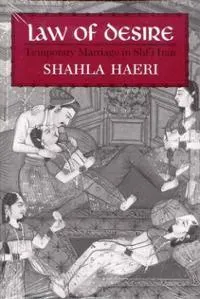Law of Desire: Temporary Marriage in Shi'i Iran
By (author): "Shahla Haeri"
Publish Date:
October 1989
ISBN0815624832
ISBN139780815624837
AsinLaw of Desire: Temporary Marriage in Shi'i Iran
Original titleLaw of Desire: Temporary Marriage in Shi'i Iran
This book is a study of the institution of temporary marriage, mut'a, and its practice, popularly known as sigheh, in contemporary Iran. The focus is not just on women but on the perception of the institution by some Iranian men and women whose lives have been tied together by a contract of temporary marriage. This book is also about law and custom, religion and morality, public and private contracts, eroticism and desire. An important chapter is devoted to Shi'i legal interpretation, exploring its underlying logic and assumptions concerning women, men, marriage, and sexuality. The institution of marriage, with its focal value in society, presents a suitable framework for disentangling the complex and elusive life of Muslim women. A culturally specific signifier, marriage constitutes its own "language," the knowledge of which enables one to appreciate a particular form of social organization, its structure, and the meaning of gender relations within it. The author brings to light the underlying logic of marriage and its associated doctrinal assumptions, conceptualizations, and images of women, men, and their relationships in Shi'i Islamic law of marriage and sexuality. Outside of the religious establishment and the ongoing disputes between Shi'i and Sunni scholars, the attitude toward temporary marriage has been primarily one of ambivalence and disdain. Before the revolution of 1979, the secular Iranian middle classes dismissed temporary marriage as a form of prostitution that had been legitimized by the religious establishment, who, to use a popular Persian expression, "put a religious hat on it." The religious hierarchy, on the other hand, becoming increasingly vocal and critical of the decadence of the Pahlavi regime, particularly its tolerance of women's autonomy, advocated temporary marriage as God's mercy on humanity, necessary for the individual's health as well as for maintaining social order. Both points of view are simplifications of a complex and dynamic social institution.
